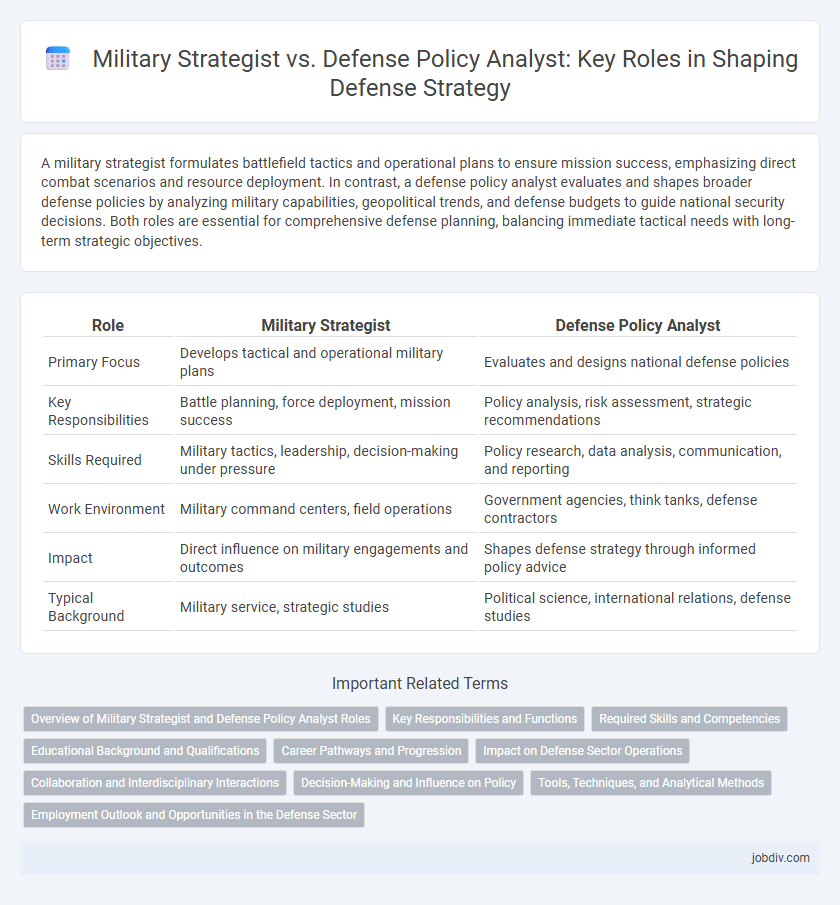A military strategist formulates battlefield tactics and operational plans to ensure mission success, emphasizing direct combat scenarios and resource deployment. In contrast, a defense policy analyst evaluates and shapes broader defense policies by analyzing military capabilities, geopolitical trends, and defense budgets to guide national security decisions. Both roles are essential for comprehensive defense planning, balancing immediate tactical needs with long-term strategic objectives.
Table of Comparison
| Role | Military Strategist | Defense Policy Analyst |
|---|---|---|
| Primary Focus | Develops tactical and operational military plans | Evaluates and designs national defense policies |
| Key Responsibilities | Battle planning, force deployment, mission success | Policy analysis, risk assessment, strategic recommendations |
| Skills Required | Military tactics, leadership, decision-making under pressure | Policy research, data analysis, communication, and reporting |
| Work Environment | Military command centers, field operations | Government agencies, think tanks, defense contractors |
| Impact | Direct influence on military engagements and outcomes | Shapes defense strategy through informed policy advice |
| Typical Background | Military service, strategic studies | Political science, international relations, defense studies |
Overview of Military Strategist and Defense Policy Analyst Roles
Military strategists design and implement plans for armed forces to achieve national security objectives, focusing on battlefield tactics, operational logistics, and threat assessment. Defense policy analysts evaluate defense policies, conduct research on military capabilities, and advise government officials to optimize defense spending and strategic priorities. Both roles require deep understanding of geopolitical dynamics, but strategists emphasize tactical execution, while analysts prioritize policy formulation and impact analysis.
Key Responsibilities and Functions
Military strategists develop detailed operational plans and tactics to achieve strategic objectives on the battlefield, analyzing enemy capabilities and coordinating troop movements. Defense policy analysts evaluate national security policies, assess defense budgets, and provide recommendations to shape military and defense strategies at a governmental level. Both roles require deep understanding of military theory, geopolitical dynamics, and resource allocation to enhance a nation's defense posture.
Required Skills and Competencies
Military strategists require expertise in tactical planning, battlefield analysis, and operational command, emphasizing critical thinking and decision-making under pressure. Defense policy analysts excel in research, policy evaluation, and intelligence assessment, focusing on strategic communication and understanding geopolitical dynamics. Both roles demand strong analytical abilities, but strategists prioritize direct combat strategy, while analysts concentrate on shaping defense policies and long-term national security strategies.
Educational Background and Qualifications
Military strategists typically possess advanced degrees in military science, strategic studies, or international relations, often graduating from military academies or defense universities with rigorous training in tactical operations and leadership. Defense policy analysts generally hold academic qualifications in political science, public policy, or security studies, emphasizing analytical skills and experience in government or think tank research institutions. Both roles demand strong analytical capabilities, but military strategists focus on operational planning while defense policy analysts specialize in the formulation and evaluation of defense policies.
Career Pathways and Progression
Military strategists typically begin their careers with rigorous training at military academies, advancing through ranks with experience in operational planning and leadership roles, often moving into senior command positions. Defense policy analysts usually start with academic qualifications in political science or international relations, gaining expertise through roles in government agencies, think tanks, or defense contractors, progressing towards senior advisory or policy development roles. Both career paths demand continuous learning and adaptability to evolving geopolitical landscapes, but military strategists emphasize tactical and operational execution while defense policy analysts focus on formulating and evaluating strategic policies.
Impact on Defense Sector Operations
Military strategists shape defense sector operations by designing comprehensive battle plans, analyzing threats, and optimizing force deployment to achieve tactical superiority. Defense policy analysts influence operational effectiveness by evaluating security policies, assessing geopolitical risks, and advising on resource allocation to align military actions with national defense objectives. Both roles are critical for integrating strategic foresight with policy frameworks, directly impacting mission success and defense readiness.
Collaboration and Interdisciplinary Interactions
Military strategists and defense policy analysts collaborate by integrating tactical expertise with policy frameworks to enhance national security outcomes. Their interdisciplinary interactions involve sharing intelligence insights, assessing geopolitical risks, and aligning military capabilities with political objectives for comprehensive defense planning. Effective collaboration ensures that strategic operations are informed by robust policy analysis, leading to adaptive and resilient defense strategies.
Decision-Making and Influence on Policy
Military strategists specialize in developing operational plans and tactics based on battlefield intelligence and strategic objectives, directly shaping military decision-making with a focus on immediate and long-term combat effectiveness. Defense policy analysts evaluate and interpret defense-related data, political contexts, and budget implications to influence the formulation and revision of national defense policies. The decision-making process of military strategists centers on actionable military outcomes, while defense policy analysts drive broader policy frameworks that guide military resource allocation and strategic priorities.
Tools, Techniques, and Analytical Methods
Military strategists employ war-gaming simulations, battlefield scenario modeling, and tactical decision-making frameworks to develop operational plans and assess combat effectiveness. Defense policy analysts utilize quantitative data analysis, policy evaluation models, and geopolitical risk assessment tools to formulate defense strategies and evaluate national security implications. Both professions integrate intelligence reports and statistical software, but strategists prioritize real-time tactical analysis while analysts emphasize long-term policy impact assessments.
Employment Outlook and Opportunities in the Defense Sector
Military strategists are projected to see steady demand within the defense sector due to their expertise in operational planning and tactical decision-making, critical for national security and military operations. Defense policy analysts face growing opportunities driven by increasing government investments in defense technology and the need for expert evaluation of defense policies and international security threats. Both career paths offer robust employment prospects supported by heightened global defense budgets and evolving geopolitical challenges.
Military Strategist vs Defense Policy Analyst Infographic

 jobdiv.com
jobdiv.com